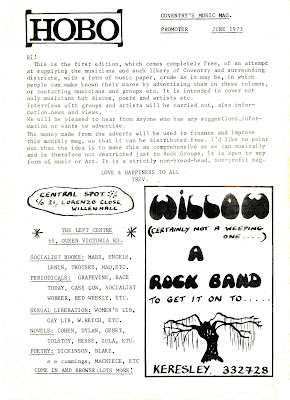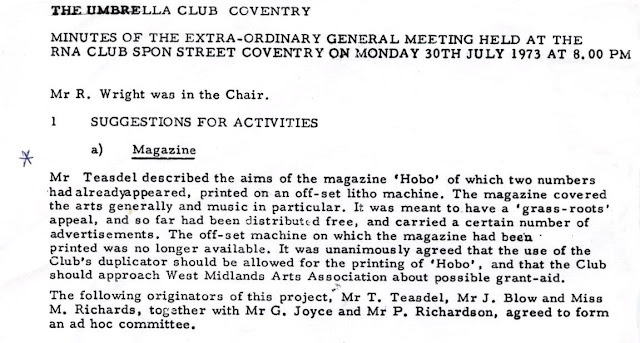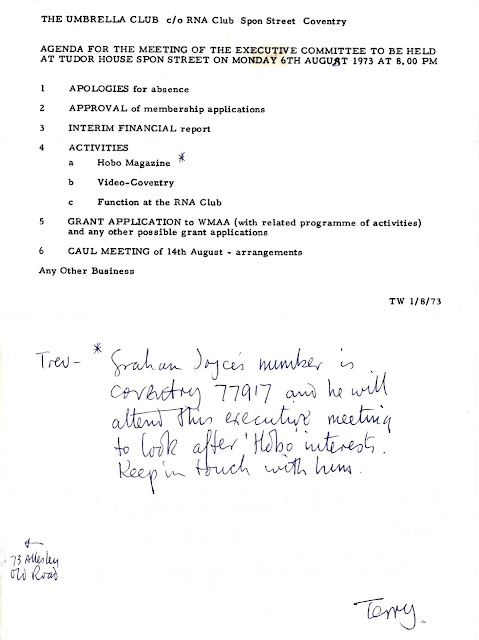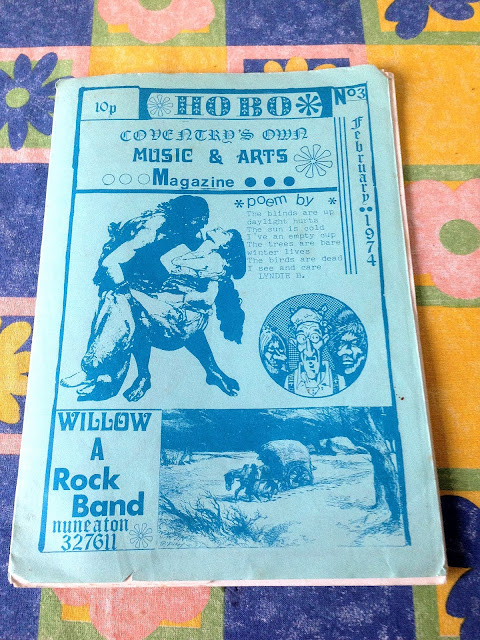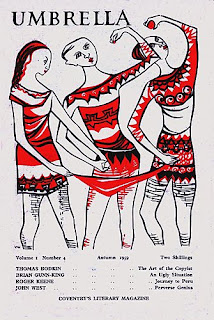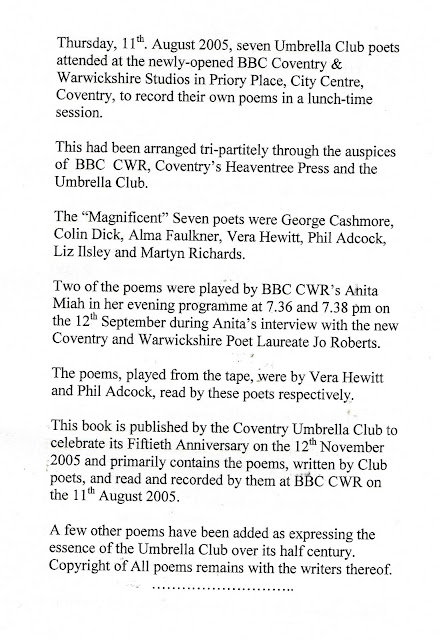Between 1956 and 1963 The Club published 8 magazines containing a wide variety of poems, articles, reviews, prints etc by members and others connected to The Club, perhaps by having given a talk.
The magazines all had very distinctively designed covers. Terry Watson was the editor of these distinguished and well produced literary magazines, boasting such contributors as EMFoster and Phillip Larkin.
If Terry had done no more for the club, these magazines are a fine contribution in themselves.
I joined the club October 1969 and witnessed how Terry, along with the Umbrella committee, advocated for and kept the club going through difficult times when the club’s existence was threatened by demolition, which eventually took place in 1973. Some of Terry’s advocation can been seen below from his Recovering the Umbrella document.
In the summer of 1970 I shared a house with Terry and two other Umbrella committee members – Al Docker and Tony Cross in Brunswick Road near the Butts Tech. Terry could be heard hitting the keys on his typewriter well into to the wee hours, typing out memos, programmes and letters to keep the Umbrella ticking over. In 1971, as I fumbled around on the Umbrella piano, trying to work out chords and sequences without a tutor or manuscript, Terry came up to me and suggested I had some ability and should consider enrolling on a music course at college. I never made it to music school but he’d planted a seed and later I enrolled on a Social Studies course, later gaining a degree in the Humanties! Later still, having taught Creative Writing for the Workers Educational association and Leeds University Adult Education, I’ve helped many others into further or higher education, knowing how important a little encouragement can be!
Terry was a member of the Umbrella Poets, both as an organiser and a fine poet himself. I recall hearing him read his poems at the Umbrella, Warwick University and the Belgrade Theatre. One that stands out, and influenced by the Movement, was What I can’t Properly Understand and others Locked In and Imagine a Cave and How her Hair Falls. His delivery was clear and strong and held your attention. It really is a shame none of his poems are available either on the internet or, as far as i know, in book form.
I can’t comment on Terry’s work as a teacher, but he was a great organiser, advocate and poet. I’m sure Terry gave a lot to his pupils / students. I know from personal experience that Terry saw potential in people and as the document below indicates, he saw the work of the Umbrella as a means for personal and cultural growth and took pride in that development. One of the phrases he used that stuck in my mind as a young man and which became a corner stone of my own arts practice was the word ‘Cross-fertilisation of ideas‘ and the arts. “This permanent meeting place drew people together in various ways, producing a cross-fertilisation of ideas, always with the possibility of making things actually happen.“. This was so inspiring to read and something I always borne in mind later. The ‘possiblity’ of ‘making things happen‘ is so empowering. The Umbrella club certainly ‘empowered‘ me and many others. Through Terry’s encouragement I took over organising the Friday night live Music spot at 19. When Terry described me as “Convenor of Live Music” in 1970, that was empowering. It changed the way I thought about myself and i then viewed myself as an organiser and someone who ‘could make things happen’. It happened again when i organised the Humpoesic Happening events in 1972 – experimental poetry and music sessions. I fully endorse Terry’s piece below. Terry and the Umbrella did shape lives, provide experience and direction and enabled you to contribute positively to its success. This is so important in an age where young people grow up in a culture of consuming arts and entertainment rather than creating or facilitating it.
Immediately after the loss of the Queen Victoria Road premises, I started Hobo magazine, to continue the work for the local music scene that I had been involved with at the Umbrella. At one stage, when we couldn’t afford to get the magazine printed, Terry offered to let us use the Umbrella’s duplicator. Later, when searching for a venue to once again host and encourage local bands, Terry introduced me to Henry West, who was both on the Umbrella’s executive committee and head of Coventry Voluntary service Council. Henry introduced me to his newly appointed Detached Youth Worker – Bob Rhodes who needed contact with young people in the city centre area and in return facilitated Hobo magazine with office space, a duplicator and a new venue at the Holyhead Youth Centre. While the Umbrella found a temporary home for some of its programmes, the Holyhead continued the work with local bands and musicians. The Hobo Workshop, as written elsewhere, gave opportunity to local bands and musicians, many of who went on to better things with or around Two Tone. We also held alternative film and street-theatre nights, carrying on other traditions from the Umbrella.
Thank you Terry
Jean Jennings (neé Gough) left a comment
“Thank you for bringing back some wonderful memories of the Umbrella Club. I was a very keen member in the 50’s, assisting Terry Watson with the secretarial jobs and publicity. I remember him bringing to the club the first electric typewriter – a scary monster. He was truly an inspired person and brought such enthusiasm to the club.”
RECOVERING THE UMBRELLA – Terry Watson 1973
If you walk along Queen Victoria Road from Queen’s Road towards the city, you will notice on your right hand a long, narrow demolition site, a gap like a missing tooth.
This gap leaves an empty space not only in the city scene but also in many people’s lives, for until recently it was the site of the premises of Coventry’s Umbrella Arts Club.
For the first time since 1955 the umbrella has been left without premises of it’s own.
It was like no other organisation, it provided opportunities for development of latent abilities in creatively minded people.
Many case histories could be cited of individuals who, having joined the Umbrella, attracted by it’s atmosphere or its activities, discovered in themselves hidden talents which they never imagined existed.
This happened at all ages: there is a man of seventy who will tell you with great enthusiasm how he took up oil painting as a result of Umbrella contacts; but mostly the Umbrella catered for the 18 – 35 age group, of which the leisure welfare is not officially so well served as in the case of older or younger age-groups.
Take the case of the young man, Michael, who inclinations has been vaguely directed towards what one might call the seedier aspects of Coventry’s night life, who on contact with the Umbrella began to develop an interest in the way the club organised its activities, became an elected voluntary officer and after considerably improving his position in the firm he worked for got married (through a friendship made a t the Umbrella) and eventually moved down to the West Country where he and his wife are running a most successful guest house and riding stables. He will readily admit that it was the Umbrella which gave his life meaning and purpose at a critical stage.
Or consider Dorothy, who was, as they say, a girl at risk at the time when she drifted into the Umbrella club for a late night coffee. She was curiously fascinated by some paintings which happened to be displayed on the walls, was prompted to ask what went on in this place, consequently attended one or two drama group meetings, subsequently helped in a determined and increasingly efficient manner with some necessary typing, courses, and eventually got herself a university place and achieved considerable academic success. She will described how the Umbrella opened her eyes to undreamed of possibilities for the development of her life.
Time and again the Umbrella has acted as a catalyst for unexplored potential.
It was a context which in many subtle and almost undefinable ways stimulated people to think creatively. It made them rethink their life-patterns. It made them sometimes discontented, and then provided satisfaction in its own activities, or prompted them to begin a quest for fulfilment elsewhere.
One basic factor was the permanent availability of the place itself, providing an ambience neutral except in so far as it was permeated by an interest in the arts, not obtrusively so, but pervasively there in the décor, displays and activities.
This permanent meeting place drew people together in various ways, producing a cross-fertilisation of ideas, always with the possibility of making things actually happen.
It is not the writer’s intention to stress unduly the socially therapeutic value of the work of the Umbrella: it was a spin-off of the method and never deliberate policy. It is far from the truth that members or visitors should be looked upon or regard themselves as ‘cases’.
New arrivals were struck by the openness of conversation and the ease of social contacts. This was often remarked upon. People were accepted and accepted each other as unique individuals whatever their work or life situation elsewhere might be.
If the Umbrella is so desirable, what then is the problem? Just the provision of a place. Since 1955, until recently, the Umbrella has rented property from Coventry Corporation, first at 97, Little Park St. and then 18, Queen Victoria Road. Now it has not been possible to find suitable alternative accommodation, with the inevitable march of redevelopment, and the Umbrella meets occasionally in a hired room, which is not at all what it is about.
It needs a place to meet regularly, suitable to be made into a reasonably attractive social meeting place with a modest coffee bar, and a room for talks, discussions and the playing of music, with facilities for the display of pictures and other art objects, with an area for the carrying out of necessary administration functions. It’s good if it can be open late, so that it is useful if it can be near central transport facilities.
Some people call this kind of place an arts centre, but this terminology can lead to confusion with things of a related but different kind, such as the plush arts faculty of the University of Warwick, desirable but objectively very different in function.
So what can we call it? What better than an ‘Arts Umbrella’
Terry Watson (Organiser of Coventry Arts Umbrella Club) c 1973
AND for all those reasons and more its sad the Umbrella was never properly facilitated after the demise of the Queen Victoria Road premises.
Some memories from ex pupils of King Henry V111 (via Historic Coventry site)
“Also, who was the 6ft plus art teacher who wore bright shirts and “kipper” ties? He drove a bubble car, which we picked up and manouevered through a hole in the wire fence into the tennis courts one day, repairing the fence after us. I guess that they were the good old days – at least some of them!…
The chap who taught art and English and drove a bubble car was T.C.(Tic) Watson. He had part of some fingers missing, allegedly a wartime injury.
I had Tic for one year. It was widely believed among us that he was suffering from what we all knew as ‘shell shock’; he wouldn’t say Boo to a sparrow, let alone a goose.
Bryn, the teacher you refer to is T C (Tic) Watson. He was indeed tall, and drove a bubble car, although I have no idea how he got into it! He taught English as well as art, I believe, and there were all sorts of stories about what happened to his hands. Some sort of wartime heroics were spoken of, as you say.
Ah, fond memories of Tic’s double art period on Friday afternoon – a great finish to the week. No academic input, just messing about with paint and paper, no homework, no tests… But I thought his name was Tony. A young (ish) lady met my Mum and me in Owen’s cafe once, and asked if Tony Watson still taught there. I got the impression she had known him well. Tic was normally very calm, but following complaints from room 13 below his art room, he asked us to carefully place our chairs back so as not to make a noise. So one of the class clowns deliberately did the exact opposite, scuffing his chair backwards and forwards violently. Tic saw this and yelled at him. He finished up by saying “I’m bloody well fed up with you Archerman!” It was the first time we’d heard a teacher use a swear word.”
…………………………………..
In the school’s magazine Coventrian there is an Obituary of Terry Watson, long-serving English and Art master – although I haven’t seen it.



 Meanwhile in the basement of the Holyhead Youth Centre, Charley Anderson, later of the Selecter was working as a youth worker and was rehearsing reggae style with a group of musicians who would later people the Two Tone bands Specials and Selecter. Trev had invited Neol Davies to the first Hobo workshop gig to organise another jam session similar to the one he organised at the Umbrella in 1970. Trev had invited Charley’s band to join in but the guys declined as they were at that stage gaining their confidence. Neol went down to jam with them and try and persuade them to join in the jam session upstairs. Neol didn’t re-emerged from the cellar and the next time we saw Neol and Charley, they were in a band called Chapter 5, so the work which began at the Umbrella in regards to the local music scene continued through Hobo Magazine and Workshop.until the end of 1975. The full story of the Hobo Workshop will be on the Hobo site soon http://coventrymusicarchives.blogspot.co.uk/
Meanwhile in the basement of the Holyhead Youth Centre, Charley Anderson, later of the Selecter was working as a youth worker and was rehearsing reggae style with a group of musicians who would later people the Two Tone bands Specials and Selecter. Trev had invited Neol Davies to the first Hobo workshop gig to organise another jam session similar to the one he organised at the Umbrella in 1970. Trev had invited Charley’s band to join in but the guys declined as they were at that stage gaining their confidence. Neol went down to jam with them and try and persuade them to join in the jam session upstairs. Neol didn’t re-emerged from the cellar and the next time we saw Neol and Charley, they were in a band called Chapter 5, so the work which began at the Umbrella in regards to the local music scene continued through Hobo Magazine and Workshop.until the end of 1975. The full story of the Hobo Workshop will be on the Hobo site soon http://coventrymusicarchives.blogspot.co.uk/
